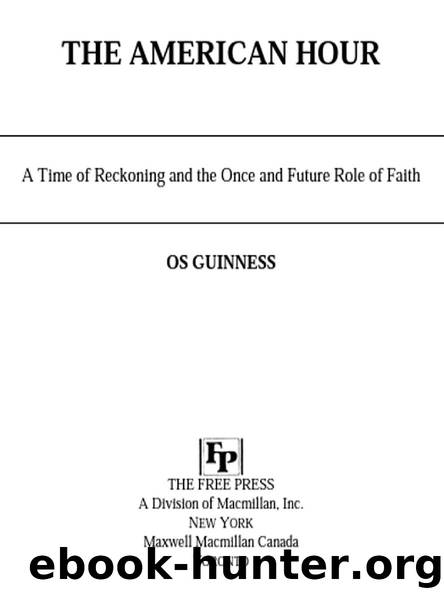THE AMERICAN HOUR by Os Guinness

Author:Os Guinness
Language: eng
Format: epub
Publisher: The Free Press A Division of Macmillan, Inc.
Published: 1993-07-15T00:00:00+00:00
Tribespeople, Idiots, or Citizens?
George Washington’s home, Mount Vernon, is among America’s most visited sites. But one of the most fascinating things at Mount Vernon is one of the least noticed—the key to the Bastille, the forbidding Paris fortress whose fall on July 14, 1789, became the symbol of the French Revolution. The key hangs in the hall at Mount Vernon, oversized for its classically proportioned surroundings and often overlooked. But it once spoke eloquently for the highest hopes in both nations. Six weeks after the ratification of the U.S. Constitution in September 1787, Jefferson rejoiced at the meeting of the Estates General and the prospect of applying revolutionary American principles to France. In that same spirit, the Marquis de Lafayette took the key of the Bastille in 1789 and sent it to his good friend Washington as a symbol of their common vision of the future.
Jefferson’s and Lafayette’s hopes were to be dashed. Sobered by the reign of terror and the revolutionary ugliness from Robespierre and Danton to Napoleon, both Americans and French supporters of the United States revised their views. Gouverneur Morris, for example, the U.S. ambassador to France, wrote home in disgust: “They want an American Constitution with the exception of a king instead of a President, without reflecting that they have no American citizens to uphold that constitution.” 1
Two hundred years later, that discussion sounded astonishingly fresh as the stirring events of 1989 unfolded. Old hopes and fears that the framers’ generation would have understood were alive again. Issues that echo those discussed by Washington and Jefferson were in the air—how realistic is it to view democracy as a model set of political arrangements to be exported? What is the role of technology as a force for freedom and democratic change? For democracy to prosper, does a nation have to have certain ideals and assumptions, or is it enough to copy institutions and political arrangements, such as free, recurrent elections, separation of the executive and judiciary branches, and respect for civil liberties?
Opinions differ sharply over the answers to these questions. But what seems odd in a century clouded by state repression and sectarian violence is that no part of the American experiment stands out more clearly yet is less appreciated or copied as a key to modern troubles than the religious liberty clauses of the First Amendment. The tensions and challenges now surrounding the clauses are some of the deepest and most significant issues of our time. Above all, there is the simple but vital question: How do we, in an age of expanding worldwide pluralism, live with our deepest—that is, our religiously and ideologically intense—differences? In short, what is the relationship of religious liberty and American democracy today?
This chapter and the next examine the third task of rebuilding a civil society—reforging the public philosophy. They move from the negative side of reappraising the controversies and repudiating civil religion to something constructive. Again, the overall purpose is reconstitution—the genuine reappropriation of the constitutional heritage through citizens engaging
Download
This site does not store any files on its server. We only index and link to content provided by other sites. Please contact the content providers to delete copyright contents if any and email us, we'll remove relevant links or contents immediately.
The 5 Love Languages: The Secret to Love That Lasts by Gary Chapman(9772)
The Space Between by Michelle L. Teichman(6923)
Assassin’s Fate by Robin Hobb(6193)
Wiseguy by Nicholas Pileggi(5762)
Everything Happens for a Reason by Kate Bowler(4729)
Gerald's Game by Stephen King(4634)
Pillow Thoughts by Courtney Peppernell(4268)
A Simplified Life by Emily Ley(4155)
The Power of Positive Thinking by Norman Vincent Peale(4053)
Harry Potter and the Prisoner of Azkaban (Book 3) by J. K. Rowling(3346)
Resisting Happiness by Matthew Kelly(3335)
Girl, Wash Your Face by Rachel Hollis(3273)
Being Aware of Being Aware by Rupert Spira(3270)
The Code Book by Simon Singh(3168)
The Secret Power of Speaking God's Word by Joyce Meyer(3154)
More Language of Letting Go: 366 New Daily Meditations by Melody Beattie(3017)
Real Sex by Lauren F. Winner(3002)
Name Book, The: Over 10,000 Names--Their Meanings, Origins, and Spiritual Significance by Astoria Dorothy(2967)
The Holy Spirit by Billy Graham(2938)
